ST. JOHN PAUL II (1920-2005)
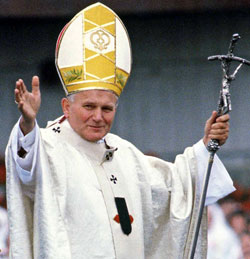 Karol Wotjtyla, the future Pope John Paul II, was born into a devout Catholic family in Poland in 1920. By the age of 20 he was alone in the world having lost both his parents and his only brother. Living under Nazism and then Communism, be became a priest and later the Archbishop of Krakow. He was created a Cardinal in 1967 by Pope Paul VI. He made important contributions to Vatican Council (1962 – 1965). He was elected Pope in 1978 and continued to lead the church until his death in 2005.
Karol Wotjtyla, the future Pope John Paul II, was born into a devout Catholic family in Poland in 1920. By the age of 20 he was alone in the world having lost both his parents and his only brother. Living under Nazism and then Communism, be became a priest and later the Archbishop of Krakow. He was created a Cardinal in 1967 by Pope Paul VI. He made important contributions to Vatican Council (1962 – 1965). He was elected Pope in 1978 and continued to lead the church until his death in 2005.
St. John Paul II has made an enormous contribution not only to the church but to the whole world, as a powerful moral leader and courageous witness to the truth. He is one of the greatest teachers in the history of the church, and a sure guide to people in this age of so much confusion around fundamental issues of life and morality. As an outstanding philosopher, he reflected deeply and wrote extensively on the great dignity of the human person, made in the image and likeness of God, and destined with both soul and body to share in eternal happiness in heaven. He travelled the world strengthening the faith of the Catholic communities, and building fraternal relations with people of other faith traditions. His important contribution to the fall of Communism in Eastern Europe is widely acknowledged.
Vocation to Love
For St. John Paul II, love is the secret of all meaning and happiness in life. He writes “Man cannot live without love … he remains a being that is incomprehensible for himself. His life is senseless” (‘The Redeemer of Man” 10). He calls love “the fundamental and innate vocation of every human being” (“Christian Family in the Modern World” N.11). The right way to relate to another person is to love that person. This great saint makes it very clear that love is not all about oneself and one’s own wishes and desires. Rather it is essentially about giving of oneself as a gift for others. He builds on the teaching of Vatican 11 Council that a person “cannot fully find himself except through a sincere gift of self” (“The Church in the Modern World” 24). St. John Paul 11 teaches that the opposite to loving a person is not to hate the person, but rather to use or exploit the person as a thing or an object for one’s own pleasure or advantage.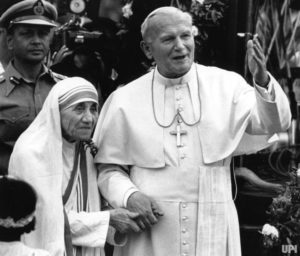
Love as the “sincere gift of self” takes place especially in marriage, where the spouses give themselves totally to each other including the gift of fertility. But in consecrated celibacy a person also lives his or her life as a gift to God and to other people, through a life of loving service in the community. This “sincere gift of self” benefits not only the individual and the family but also the wider community, through building up a society where there is justice and peace, care and concern for the common good.
The Body as Integral to the Person
In his great work “Theology of the Body” St. John Paul II develops the teaching of Blessed Paul VI in Humanae Vitae on birth regulation, and leads us to “the rediscovery of the meaning of the whole of existence, of the meaning of life” (Theology of the Body 46:6). He directly challenges the widely accepted secular view that the body is just a thing or a possession, and that a person can treat it or mistreat it as he or she wishes. The saint carries forward and further develops the great Christian tradition, which sees the body as part of a person’s identity of who he or she is, and not just as a receptacle or prison for the soul. This means that one can truthfully say: my body is me, being part of who I am as a person. My body will rise again on the last day to be re-united with my soul for all eternity in the happiness of heaven – this is our great Christian hope. It is through my body that I relate to others, to the world around me, and also to God and the spiritual world.
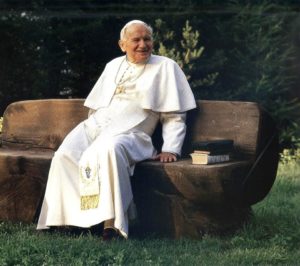 People should therefore respect their bodies and how they function. This is obviously important when it comes to satisfying the urge for food and drink, if people wish to lead healthy lives. It is particularly relevant in today’s world when dealing with the area of sexuality. Christopher West writes, “When we divorce sex from its natural orientation towards life, what is left to prevent the justification of any and every means to sexual climax? … When we pry sex from its most natural consequence, we inevitably lose our moral compass” (Christopher West, “Theology of the Body for Beginners” P.104-105). When one is no longer guided by a moral compass it means that sexuality is out of control. There is no right or wrong behaviour.
People should therefore respect their bodies and how they function. This is obviously important when it comes to satisfying the urge for food and drink, if people wish to lead healthy lives. It is particularly relevant in today’s world when dealing with the area of sexuality. Christopher West writes, “When we divorce sex from its natural orientation towards life, what is left to prevent the justification of any and every means to sexual climax? … When we pry sex from its most natural consequence, we inevitably lose our moral compass” (Christopher West, “Theology of the Body for Beginners” P.104-105). When one is no longer guided by a moral compass it means that sexuality is out of control. There is no right or wrong behaviour.
By enabling people to suppress the life-giving meaning of sex and focus only on the love or pleasure meaning, contraception has opened the way to the sexual anarchy so prevalent at the present time. West points to the profound implications that the acceptance of contraception has for the Christian message. In his words, “On this point we face a dramatic, but often undetected, clash between the forces of good and evil, between the fundamental human decision to love or not to love, to choose life or to oppose it. Indeed the entire Christian sexual ethic …. either stands or falls on this point.” (Christopher West: “Good News About Sex and Marriage” P.108).
Nowadays, helped by the ecological movement, more and more women are promoting human ecology in showing respect for their own bodies, and in particular for their precious gift of fertility, by keeping away from contraception and sterilization. When necessary to space births they gladly cooperate with their natural cycle, by using natural family planning which is almost one hundred percent effective. As well as that, it strengthens their mutual love so that the risk of divorce is extremely low. It prepares them to give the correct guidance to their children in the area of chastity.
They are putting into practice the advice of Dr John Billings, “The time is now at hand when no woman in her right mind will take birth control medication, no husband in his right mind will allow her to take it, and no doctor in his right mind will prescribe it” (“Gift of Life and Love” p.68-69). These couples are acting fully in accordance with nature itself. St. John Paul II calls this the “language of the body” and tells us that “The body speaks the truth though conjugal love, faithfulness and integrity” (Theology of the Body 105:2). They are also following the teaching of Blessed Paul V1 who writes that according to the Natural Law contraception and sterilization “are to be absolutely excluded as lawful means of regulation of the number of children” (Humanae Vitae 14).
Called to be Pro-Life
Bringing the traditional human and Christian values into society, especially regarding the beauty and sacredness of human life, was a great concern for St. John Paul 11. He deals with this very important issue in his beautiful Encyclical Letter, “The Gospel of Life”. Here he writes in reference to abortion and euthanasia, that “human life belongs only to God: for this reason, whoever attacks human life in some way attacks God himself” (No.9). He calls abortion “a war of the powerful against the weak” and “a kind of conspiracy against life”. He warns of the danger of reverting “to a state of barbarism which one hoped had been left behind forever” (No. 14).
Viewing the situation in today’s world with its widespread support for attacks on human life he writes: “This situation, with its lights and shadows, ought to make us all fully aware that we are facing an enormous and dramatic clash between good and evil, death and life, the ‘culture of death’ and the ‘culture of life’. We find ourselves not only ‘faced with’ but necessarily ‘in the midst of’ this conflict: we are all involved and we all share in it, with the inescapable responsibility of choosing to be unconditionally pro-life” (No.28). He writes, “With humility and gratitude we know that we are the people of life and for life, and that is how we present ourselves to everyone” (N.78).
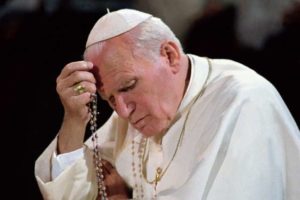 People cannot be neutral and passive, nor apathetic and timid on the issue of life. The fifth commandment says very clearly “You shall not kill” (Ex 20:13; Ex 23:7; Deut. 5:17; Mt. 5:21-22). The Catechism of the Catholic Church is equally clear in teaching that “Human life must be respected and protected absolutely from the moment of conception” (CCC 2270). This is based on medical science that a new life begins at conception. Not only are abortion and euthanasia totally ruled out by this commandment, but so also are other attacks on innocent human life, such as embryonic stem cell research and in vitro fertilization (test tube babies). Both of these procedures involve the destruction of human embryos, and all these are human persons as the Catechism teaches, “From the first moment of his existence, a human being must be recognized as having the rights of a person – among which is the inviolable right of every innocent being to life” (CCC 2270).
People cannot be neutral and passive, nor apathetic and timid on the issue of life. The fifth commandment says very clearly “You shall not kill” (Ex 20:13; Ex 23:7; Deut. 5:17; Mt. 5:21-22). The Catechism of the Catholic Church is equally clear in teaching that “Human life must be respected and protected absolutely from the moment of conception” (CCC 2270). This is based on medical science that a new life begins at conception. Not only are abortion and euthanasia totally ruled out by this commandment, but so also are other attacks on innocent human life, such as embryonic stem cell research and in vitro fertilization (test tube babies). Both of these procedures involve the destruction of human embryos, and all these are human persons as the Catechism teaches, “From the first moment of his existence, a human being must be recognized as having the rights of a person – among which is the inviolable right of every innocent being to life” (CCC 2270).
A baby’s heart begins to beat at about 3 weeks and can be heard in the normal clinical setting at about 6 weeks. At about 8 to 10 weeks the baby can feel pain and will draw back from an abortion instrument. Abby Johnson, a former Planned Parenthood employee of the year, recounts her experience of watching an abortion on ultrasound, which led to her conversion. She writes, “…. and he (baby) jumped … trying to flee but with nowhere to go, he moved all the way up to the top of his mother’s womb … The little boy didn’t stand a chance – but he did fight”.
This is the grim reality of abortion which very many people do not wish to hear about. One life is destroyed but it also affects the life of the mother. Frequently she experiences an overwhelming sense of grief, guilt and remorse as well as depression, insomnia and difficulty in coping with daily life. The church has an important role to play in showing compassion and love to such mothers on the path to healing and recovery, by helping them to forgive themselves and to accept God’s forgiveness, trusting in His unconditional love and infinite mercy. The fathers of aborted babies are also affected and frequently need to go through a similar healing process.
Under a mistaken notion of tolerance there are many ordinary, good people who give silent or tacit support to abortion by saying: “Personally I’m against abortion but who am I to oppose it if someone really wants it?” They would never use the same argument to justify rape or racism or slavery or torture or human trafficking or child-labour etc. All of these are crimes but none of them are as serious as abortion, because they do not put an end to some innocent human life. St. John Paul 11 leaves people in no doubt about how serious abortion really is when he writes, “We need now more than ever to look the truth in the eye and to call things by their proper name ….. The moral gravity of procured abortion is apparent in all its truth if we recognise that we are dealing with murder” (“The Gospel of Life” 58) And there is no such thing as a “little murder” or a “justifiable murder”!
Very many people are so brainwashed by all the pro-abortion propaganda, that they can no longer think clearly about this terrible crime. They don’t wish to hear about it or to talk about it because it makes them feel uncomfortable. This passive, cowardly attitude has contributed very significantly to the spread of abortion, to the extent that at the present time it accounts for the deaths of about 50 million babies every year – ending about one in every five pregnancies. Abortion is the silent holocaust in today’s world, financially supported by many governments and a large number of influential organisations. Most of the mainline media are solidly behind abortion and are very reluctant to give any publicity or support to pro-life activities.
St. John Paul II challenges everyone saying, “We have been sent as a people. Everyone has an obligation to be at the service of life …. Together we all sense our duty to preach the Gospel of Life” (N.79). For him love is always the motivating power “On our journey we are guided and sustained by the law of love: a love which has as its source and model, the Son of God made man who by dying gave life to the world” (N.79). He makes a passionate appeal to the world to promote and protect human life, as the way to real progress and happiness. He writes, “In the name of God: respect, protect, love and serve life, every human life. Only in this direction, will you find justice, development, true freedom, peace and happiness” (The Gospel of Life 5). For dealing with the whole abortion issue, priests in particular as well as other pastoral workers, will find a lot of practical help in a short, simply-written book by Brian Clowes, entitled “A Pro-Life Pastoral Handbook”. It is published by Human Life International.
Both of St. John Paul’s successors have been equally strong in denouncing abortion. Speaking of the baby in the womb, Pope Benedict XVI declared that “This is not an accumulation of biological material, but a new living being, dynamic and wonderfully ordered, a new unique human being. So was Jesus in Mary’s womb, so it was for all of us in our mother’s womb” (22 Nov. 2010 at Pro-Life Prayer Vigil). Pope Francis teaches that “Human life is sacred and inviolable. Every civil law is based on the recognition of the first and fundamental right, that of life”. The Pope goes on, “It is therefore necessary to reiterate the strongest opposition to any direct attack on life, especially innocent and defenceless life, and the unborn child in the womb is the archetype of innocence” (11 March 2015).
St. John Paul II’s Legacy
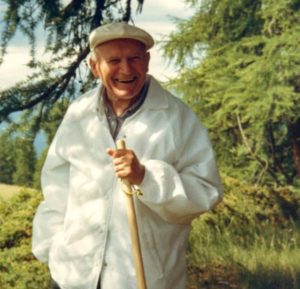 St. John Paul II has left the church and the world a very rich legacy of writings, which shed light and give wise guidance on many very grave issues facing people today. He has given us the Catechism of the Catholic Church which he declared “is a statement of the Church’s faith and of Catholic doctrine”. Apart from “Theology of the Body” and “The Gospel of Life” a few other of his writings should be mentioned: “The Christian Family in the Modern World”; “The Splendour of Truth” and “Love and Responsibility”.
St. John Paul II has left the church and the world a very rich legacy of writings, which shed light and give wise guidance on many very grave issues facing people today. He has given us the Catechism of the Catholic Church which he declared “is a statement of the Church’s faith and of Catholic doctrine”. Apart from “Theology of the Body” and “The Gospel of Life” a few other of his writings should be mentioned: “The Christian Family in the Modern World”; “The Splendour of Truth” and “Love and Responsibility”.
There are a number of writers who are helping to popularize Theology of the Body, and bring it into more and more and more families and parishes. Among them are Christopher West, Jason Evert; Mary Healy; and Dominic Baster. Christopher West describes his book, The Theology of the Body for Beginners, as a Basic Introduction to Pope John Paul II’s Sexual Revolution! An ever-increasing number of people would agree with Christopher West that St. John Paul II, building on the traditional teaching of the church, has given the church and the world the answer to the sexual revolution.
This is the Christian sexual revolution which challenged and changed the way people lived in the ancient world, and can do likewise in today’s world. But it needs to be more fully embraced and presented in all its truth and beauty in families and parishes. It is especially important for young people to hear this clear, attractive and liberating message. It will them to develop a solid, mature and enlightened faith despite all the temptations and challenges they have to face in today’s world.